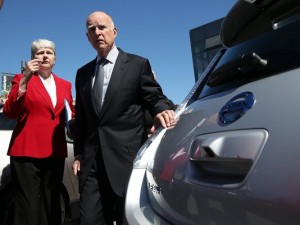 Last month at the Global Climate Action Summit in San Francisco, California Governor Jerry Brown made headlines announcing the launch of his “own damn satellite” to monitor climate pollution. The idea is not far-fetched, as a Montreal company has already launched satellites to detect methane leaks.
Last month at the Global Climate Action Summit in San Francisco, California Governor Jerry Brown made headlines announcing the launch of his “own damn satellite” to monitor climate pollution. The idea is not far-fetched, as a Montreal company has already launched satellites to detect methane leaks.
California’s satellite launch could be revolutionary for combating climate change, as it could greatly simplify the monitoring and enforcement challenge, saving money in the process and in turn allowing developing world countries to be more effective at reducing their emissions.
As E&E News reported [pay-walled]:
California’s aim is to launch the probe by the end of 2021, though state officials said a number of key details have yet to be finalized — notably funding for the project.
One big question is how much it will cost. The state has not released an estimate. Another is who is going to pay for it.
The governor’s office wants to rely on private donors and philanthropists to foot the bill, rather than taxpayers, and one Brown aide said California has yet to line up the necessary rainmakers.
But “our discussions with interested parties have been very, very positive,” Ken Alex, one of the governor’s senior advisers, said in a phone interview.
Brown will likely tap San Francisco-based Planet Labs Inc., founded in 2010 by three former NASA scientists and with Google as an equity stakeholder, to build it.
The upside is multi-fold. Specifically, the satellite could:
- Pinpoint hard-to-detect emissions from sources like landfills and fossil fuel wells, giving policy makers a more accurate way to assess where resources or policies are needed to reduce these emissions;
- Catch polluters in the act of misreporting their emissions, making enforcement easier; and
- Reduce the costs and lack of transparency in monitoring emissions, as the present methods are often opaque (in the name of protecting industry trade secrets) and burdensome.
And for countries and states less wealthy than California, the relatively low-cost satellite also means they won’t have an excuse not to invest in data collection on carbon pollution, if not mitigation measures, too.
All in all, it was a fitting — and potentially meaningful — end to the summit and to the near-close of Governor Brown’s term in office helping California fight climate change.


